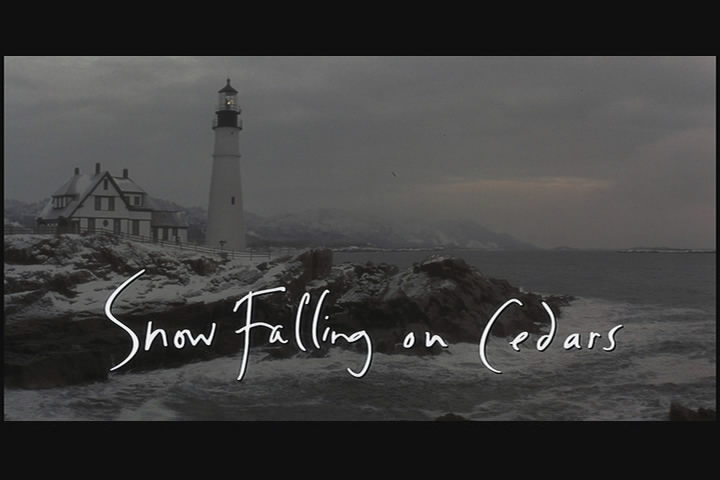
Snow Falling on Cedars

The movie is centered on the concept of prejudice.
The film opens with two guys on different boats in very thick fog. Then it moves to two guys on one boat pulling in a fishing net, and there's a body in the net. The sheriff wants to find out if there was an actual murder, and a report just wants a murder story.
Miomoto, a Japanese guy, is put on trial for the murder of Carl, the guy found in the net. The term “Jap” can be heard once or twice. The film then moves into how the sheriff did his investigations, and more trial material. The guy who does the autopsy, in his testimony, shows he definitely hates the Japanese. He had been in the war. He says the wound was from a kendo (a long Japanese wooden sword.)
The other major figure besides Minomoto and Hatsue has been Ishael, a reporter. Hatsue is the reporter's love interest, and she's now married to Miomoto. Her mother, when Hatsu was one, told her to stay away from white boys and to marry one of her own kind.
Finally, later on in the movie, we find out that Hatsue and Ishmael, the reporter, were friends in 1941 before the attack on Pearl Harbor. There's a strawberry festival parade, and Japanese women wearing kimonos are taking part.
During the trial the alien land law is talked about. Its revealed that Minomoto's parents had rented land but missed payments when they were interned, so the land they had rented was sold from under them. Minomoto had tried to get their family's land back. He was a Nisei soldier at the time.
We find out later in the film that the trial is taking place around December 7, 1950.
Another flashback goes from the attack on Pearl Harbor through the beginnings of the roundup of persons of Japanese ancestry on the West Coast.
There's a very moving scene about the Army gathering up the Japanese in the area and taking them through the town in trucks, although many Japanese also are walking behind a jeep, with Army troops around them. The group from the island is taken to the Manzanar camp.
Then there's the thing about the reporter knowing something that could probably get Minomoto cleared, but isn't sure he wants to say anything because of the past history between him and the woman that became Minomoto's wife.
It's revealed that Hatsue is the one that dumped the reporter.
The film examines the prejudice against the Japanese on the West Coast, including how feelings changed after Pearl Harbor, and how justice was overlooked in the early arrests, the searches and seizures, and the evacuation of the persons of Japanese ancestry from their homes and businesses eventually into the internment camps.
However, prejudice works both ways. Hatsue's mother, in a flashback, reveals that she does not want Hatsue to be involved with a white boy. Not that long after that Hatsue writes Ishmael a letter saying it's over between them, and she was in love and was not in love with him at the same time.
What all that makes it appear is that Hatsue's mother's prejudice against non-Japanese may have been the thing that caused Hatsue to reject Ishamel, especially after they had been sort of involved with each other for years. Hatsue ends up marrying another Japanese, thus fulfilling her mother's wishes.
Otherwise, the rest of the prejudice is revealed in certain members of the community being virulently anti-Japanese, even in 1950, five years after the end of the war.
There are a couple of things that I didn't like about the film.
First, the movie takes place in Washington in the 1950's. The only way to know that, though, is to read a review before you see the movie. There should have been some kind of quick scene noting the year and place, but there's nothing.
Second, it depended too much on an 'artsy' approach, what with numerous flashbacks to the point it was confusing at times. I personally also didn't care for some of the scenes which seemed to be there only for artistic purposes and that really had nothing to do with the actual theme of the movie at all.
In effect, I think it's a good movie as far as examining the prejudice against Japanese and Japanese-Americans during and after the war. It's a fairly good movie in that it does show, although less forcefully, that prejudice works two ways. It's only a fair movie as far as its overall presentation goes, though. Worth watching, but it can be annoying at times.
Main Index
Japan main page
Japanese-American Internment Camps index page
Japan and World War II index page
|